Tianjun Zhang
Sid
The Llama 4 Herd: Architecture, Training, Evaluation, and Deployment Notes
Jan 15, 2026Abstract:This document consolidates publicly reported technical details about Metas Llama 4 model family. It summarizes (i) released variants (Scout and Maverick) and the broader herd context including the previewed Behemoth teacher model, (ii) architectural characteristics beyond a high-level MoE description covering routed/shared-expert structure, early-fusion multimodality, and long-context design elements reported for Scout (iRoPE and length generalization strategies), (iii) training disclosures spanning pre-training, mid-training for long-context extension, and post-training methodology (lightweight SFT, online RL, and lightweight DPO) as described in release materials, (iv) developer-reported benchmark results for both base and instruction-tuned checkpoints, and (v) practical deployment constraints observed across major serving environments, including provider-specific context limits and quantization packaging. The manuscript also summarizes licensing obligations relevant to redistribution and derivative naming, and reviews publicly described safeguards and evaluation practices. The goal is to provide a compact technical reference for researchers and practitioners who need precise, source-backed facts about Llama 4.
Autellix: An Efficient Serving Engine for LLM Agents as General Programs
Feb 19, 2025Abstract:Large language model (LLM) applications are evolving beyond simple chatbots into dynamic, general-purpose agentic programs, which scale LLM calls and output tokens to help AI agents reason, explore, and solve complex tasks. However, existing LLM serving systems ignore dependencies between programs and calls, missing significant opportunities for optimization. Our analysis reveals that programs submitted to LLM serving engines experience long cumulative wait times, primarily due to head-of-line blocking at both the individual LLM request and the program. To address this, we introduce Autellix, an LLM serving system that treats programs as first-class citizens to minimize their end-to-end latencies. Autellix intercepts LLM calls submitted by programs, enriching schedulers with program-level context. We propose two scheduling algorithms-for single-threaded and distributed programs-that preempt and prioritize LLM calls based on their programs' previously completed calls. Our evaluation demonstrates that across diverse LLMs and agentic workloads, Autellix improves throughput of programs by 4-15x at the same latency compared to state-of-the-art systems, such as vLLM.
SuperCorrect: Supervising and Correcting Language Models with Error-Driven Insights
Oct 11, 2024



Abstract:Large language models (LLMs) like GPT-4, PaLM, and LLaMA have shown significant improvements in various reasoning tasks. However, smaller models such as Llama-3-8B and DeepSeekMath-Base still struggle with complex mathematical reasoning because they fail to effectively identify and correct reasoning errors. Recent reflection-based methods aim to address these issues by enabling self-reflection and self-correction, but they still face challenges in independently detecting errors in their reasoning steps. To overcome these limitations, we propose SuperCorrect, a novel two-stage framework that uses a large teacher model to supervise and correct both the reasoning and reflection processes of a smaller student model. In the first stage, we extract hierarchical high-level and detailed thought templates from the teacher model to guide the student model in eliciting more fine-grained reasoning thoughts. In the second stage, we introduce cross-model collaborative direct preference optimization (DPO) to enhance the self-correction abilities of the student model by following the teacher's correction traces during training. This cross-model DPO approach teaches the student model to effectively locate and resolve erroneous thoughts with error-driven insights from the teacher model, breaking the bottleneck of its thoughts and acquiring new skills and knowledge to tackle challenging problems. Extensive experiments consistently demonstrate our superiority over previous methods. Notably, our SuperCorrect-7B model significantly surpasses powerful DeepSeekMath-7B by 7.8%/5.3% and Qwen2.5-Math-7B by 15.1%/6.3% on MATH/GSM8K benchmarks, achieving new SOTA performance among all 7B models. Code: https://github.com/YangLing0818/SuperCorrect-llm
The Llama 3 Herd of Models
Jul 31, 2024Abstract:Modern artificial intelligence (AI) systems are powered by foundation models. This paper presents a new set of foundation models, called Llama 3. It is a herd of language models that natively support multilinguality, coding, reasoning, and tool usage. Our largest model is a dense Transformer with 405B parameters and a context window of up to 128K tokens. This paper presents an extensive empirical evaluation of Llama 3. We find that Llama 3 delivers comparable quality to leading language models such as GPT-4 on a plethora of tasks. We publicly release Llama 3, including pre-trained and post-trained versions of the 405B parameter language model and our Llama Guard 3 model for input and output safety. The paper also presents the results of experiments in which we integrate image, video, and speech capabilities into Llama 3 via a compositional approach. We observe this approach performs competitively with the state-of-the-art on image, video, and speech recognition tasks. The resulting models are not yet being broadly released as they are still under development.
Recursive Introspection: Teaching Language Model Agents How to Self-Improve
Jul 26, 2024



Abstract:A central piece in enabling intelligent agentic behavior in foundation models is to make them capable of introspecting upon their behavior, reasoning, and correcting their mistakes as more computation or interaction is available. Even the strongest proprietary large language models (LLMs) do not quite exhibit the ability of continually improving their responses sequentially, even in scenarios where they are explicitly told that they are making a mistake. In this paper, we develop RISE: Recursive IntroSpEction, an approach for fine-tuning LLMs to introduce this capability, despite prior work hypothesizing that this capability may not be possible to attain. Our approach prescribes an iterative fine-tuning procedure, which attempts to teach the model how to alter its response after having executed previously unsuccessful attempts to solve a hard test-time problem, with optionally additional environment feedback. RISE poses fine-tuning for a single-turn prompt as solving a multi-turn Markov decision process (MDP), where the initial state is the prompt. Inspired by principles in online imitation learning and reinforcement learning, we propose strategies for multi-turn data collection and training so as to imbue an LLM with the capability to recursively detect and correct its previous mistakes in subsequent iterations. Our experiments show that RISE enables Llama2, Llama3, and Mistral models to improve themselves with more turns on math reasoning tasks, outperforming several single-turn strategies given an equal amount of inference-time computation. We also find that RISE scales well, often attaining larger benefits with more capable models. Our analysis shows that RISE makes meaningful improvements to responses to arrive at the correct solution for challenging prompts, without disrupting one-turn abilities as a result of expressing more complex distributions.
Gaussian-Forest: Hierarchical-Hybrid 3D Gaussian Splatting for Compressed Scene Modeling
Jun 13, 2024



Abstract:The field of novel-view synthesis has recently witnessed the emergence of 3D Gaussian Splatting, which represents scenes in a point-based manner and renders through rasterization. This methodology, in contrast to Radiance Fields that rely on ray tracing, demonstrates superior rendering quality and speed. However, the explicit and unstructured nature of 3D Gaussians poses a significant storage challenge, impeding its broader application. To address this challenge, we introduce the Gaussian-Forest modeling framework, which hierarchically represents a scene as a forest of hybrid 3D Gaussians. Each hybrid Gaussian retains its unique explicit attributes while sharing implicit ones with its sibling Gaussians, thus optimizing parameterization with significantly fewer variables. Moreover, adaptive growth and pruning strategies are designed, ensuring detailed representation in complex regions and a notable reduction in the number of required Gaussians. Extensive experiments demonstrate that Gaussian-Forest not only maintains comparable speed and quality but also achieves a compression rate surpassing 10 times, marking a significant advancement in efficient scene modeling. Codes are available at https://github.com/Xian-Bei/GaussianForest.
Buffer of Thoughts: Thought-Augmented Reasoning with Large Language Models
Jun 06, 2024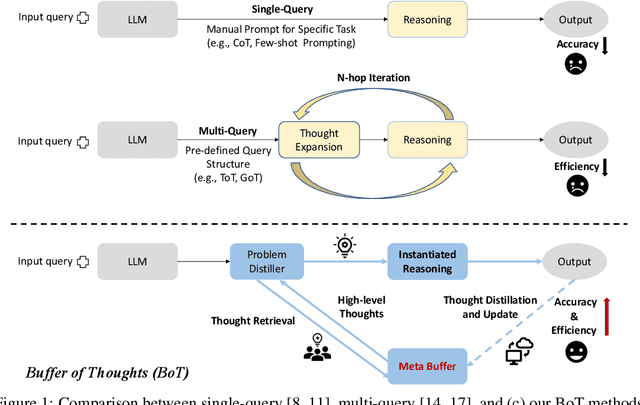

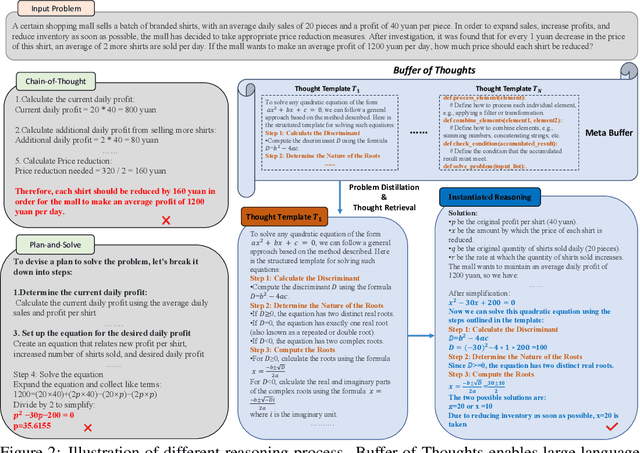
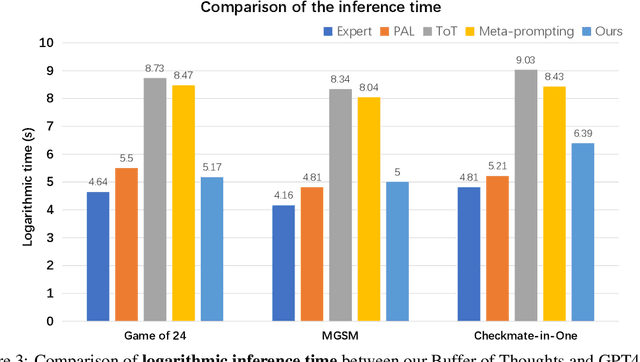
Abstract:We introduce Buffer of Thoughts (BoT), a novel and versatile thought-augmented reasoning approach for enhancing accuracy, efficiency and robustness of large language models (LLMs). Specifically, we propose meta-buffer to store a series of informative high-level thoughts, namely thought-template, distilled from the problem-solving processes across various tasks. Then for each problem, we retrieve a relevant thought-template and adaptively instantiate it with specific reasoning structures to conduct efficient reasoning. To guarantee the scalability and stability, we further propose buffer-manager to dynamically update the meta-buffer, thus enhancing the capacity of meta-buffer as more tasks are solved. We conduct extensive experiments on 10 challenging reasoning-intensive tasks, and achieve significant performance improvements over previous SOTA methods: 11% on Game of 24, 20% on Geometric Shapes and 51% on Checkmate-in-One. Further analysis demonstrate the superior generalization ability and model robustness of our BoT, while requiring only 12% of the cost of multi-query prompting methods (e.g., tree/graph of thoughts) on average. Notably, we find that our Llama3-8B+BoT has the potential to surpass Llama3-70B model. Our project is available at: https://github.com/YangLing0818/buffer-of-thought-llm
LLoCO: Learning Long Contexts Offline
Apr 11, 2024Abstract:Processing long contexts remains a challenge for large language models (LLMs) due to the quadratic computational and memory overhead of the self-attention mechanism and the substantial KV cache sizes during generation. We propose a novel approach to address this problem by learning contexts offline through context compression and in-domain parameter-efficient finetuning. Our method enables an LLM to create a concise representation of the original context and efficiently retrieve relevant information to answer questions accurately. We introduce LLoCO, a technique that combines context compression, retrieval, and parameter-efficient finetuning using LoRA. Our approach extends the effective context window of a 4k token LLaMA2-7B model to handle up to 128k tokens. We evaluate our approach on several long-context question-answering datasets, demonstrating that LLoCO significantly outperforms in-context learning while using $30\times$ fewer tokens during inference. LLoCO achieves up to $7.62\times$ speed-up and substantially reduces the cost of long document question answering, making it a promising solution for efficient long context processing. Our code is publicly available at https://github.com/jeffreysijuntan/lloco.
GoEX: Perspectives and Designs Towards a Runtime for Autonomous LLM Applications
Apr 10, 2024Abstract:Large Language Models (LLMs) are evolving beyond their classical role of providing information within dialogue systems to actively engaging with tools and performing actions on real-world applications and services. Today, humans verify the correctness and appropriateness of the LLM-generated outputs (e.g., code, functions, or actions) before putting them into real-world execution. This poses significant challenges as code comprehension is well known to be notoriously difficult. In this paper, we study how humans can efficiently collaborate with, delegate to, and supervise autonomous LLMs in the future. We argue that in many cases, "post-facto validation" - verifying the correctness of a proposed action after seeing the output - is much easier than the aforementioned "pre-facto validation" setting. The core concept behind enabling a post-facto validation system is the integration of an intuitive undo feature, and establishing a damage confinement for the LLM-generated actions as effective strategies to mitigate the associated risks. Using this, a human can now either revert the effect of an LLM-generated output or be confident that the potential risk is bounded. We believe this is critical to unlock the potential for LLM agents to interact with applications and services with limited (post-facto) human involvement. We describe the design and implementation of our open-source runtime for executing LLM actions, Gorilla Execution Engine (GoEX), and present open research questions towards realizing the goal of LLMs and applications interacting with each other with minimal human supervision. We release GoEX at https://github.com/ShishirPatil/gorilla/.
RAFT: Adapting Language Model to Domain Specific RAG
Mar 15, 2024

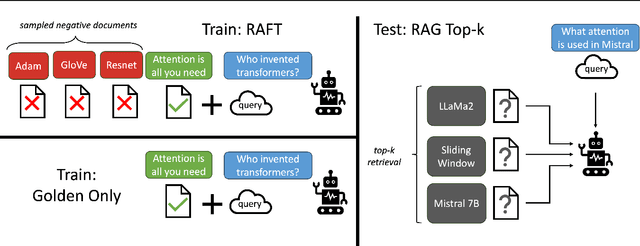
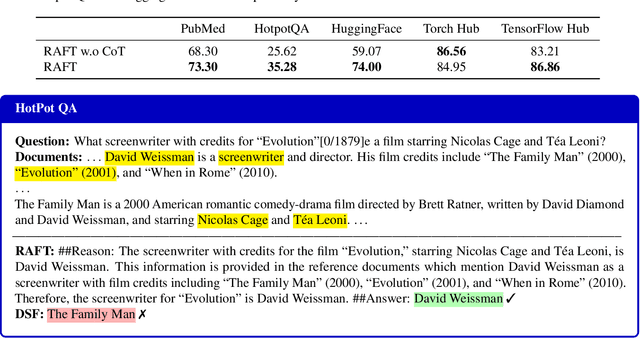
Abstract:Pretraining Large Language Models (LLMs) on large corpora of textual data is now a standard paradigm. When using these LLMs for many downstream applications, it is common to additionally bake in new knowledge (e.g., time-critical news, or private domain knowledge) into the pretrained model either through RAG-based-prompting, or fine-tuning. However, the optimal methodology for the model to gain such new knowledge remains an open question. In this paper, we present Retrieval Augmented FineTuning (RAFT), a training recipe that improves the model's ability to answer questions in a "open-book" in-domain settings. In RAFT, given a question, and a set of retrieved documents, we train the model to ignore those documents that don't help in answering the question, which we call, distractor documents. RAFT accomplishes this by citing verbatim the right sequence from the relevant document that would help answer the question. This coupled with RAFT's chain-of-thought-style response helps improve the model's ability to reason. In domain-specific RAG, RAFT consistently improves the model's performance across PubMed, HotpotQA, and Gorilla datasets, presenting a post-training recipe to improve pre-trained LLMs to in-domain RAG. RAFT's code and demo are open-sourced at github.com/ShishirPatil/gorilla.
 Add to Chrome
Add to Chrome Add to Firefox
Add to Firefox Add to Edge
Add to Edge